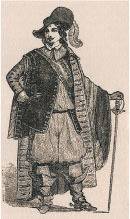It has more to do with our history than we might think
Not only is 2017 the 150th anniversary of Confederation, it is also the occasion of the 500th anniversary of the Reformation.
Without the Reformation and the Protestant form of Christianity that came from it, Canada would be a very different country.
First, the faith of the Reformation has burned in the hearts of Canadians from the very beginning of European presence in North America. Among the first French explorers and settlers in the 16th century were Huguenots, French Protestants of Calvinist ("Reformed") convictions who at that time enjoyed limited religious toleration in France.
 HUGUENOT MERCHANT PIERRE DU GUA DE MONTS ENGRAVING: LIBRARY AND ARCHIVES CANADA (4312854)
HUGUENOT MERCHANT PIERRE DU GUA DE MONTS ENGRAVING: LIBRARY AND ARCHIVES CANADA (4312854)
Pierre du Gua de Monts (ca. 1558–1628), for example, a Huguenot merchant, adventurer and explorer, helped found the first permanent French settlements in Canada. In 1603 King Henry IV of France recognized his service by appointing him lieutenant-governor of Acadia and New France.
Later French kings banned Protestantism from the Canadian colonies, but even so, some settlers continued to secretly practise that faith. Historians estimate more than 1,450 settlers during the period of New France were Protestants.
With the British conquest of New France in 1760, Canada was once again opened to Protestantism. Anglicans, Presbyterians, Congregationalists, Baptists and Methodists were among the earliest Englishspeaking Protestant settlers, and in some regions they were joined by German-speaking Lutherans and Mennonites.
In the 19th and 20th centuries, the range of Protestant groups expanded with the emergence of newer offshoots of Methodism (like the Holiness and Pentecostal churches) and newer immigrant groups (like the Dutch Reformed). In recent years evangelical groups from Asia, Africa and Latin America have added to the Protestant mix.
While these various Protestant churches disagree about various things – their freedom to do so is also a consequence of the Reformation! – they share the core convictions that beat in the hearts of the Reformers 500 years ago.
Like Luther and Calvin they stand firm on sola scriptura, the belief the Bible is the only God-breathed, infallible authority for all faith and life, and sola fide, the belief we receive God’s gift of salvation by faith alone, and not on the basis of our works or merit.
Throughout Canadian history Protestants have been a witness to these great biblical truths, and Evangelicals continue to stand for them today.
Second, the Protestant belief in the importance of knowing and understanding the Bible also led to an emphasis on education at all levels. Although Catholics have also played an important role in education in Canada, the range and number of educational institutions would be far less without the hard work of generations of Protestants.
From the efforts of early Sunday schools to the founding of the first day schools, Protestants helped lay the foundation for elementary and secondary education in several parts of the country.
They also founded the oldest English-speaking universities in Canada, such as the University of New Brunswick (1785, Anglican), the University of Toronto (1827, Anglican) and Queen’s University (1841, Presbyterian).
In the 20th century, with the secularization of public education, Protestant Evangelicals took the lead in founding a second wave of Christian elementary and high schools, Bible colleges and universities.
Finally, Protestantism deserves much of the credit for Canada’s commitment to limited, accountable government, and freedom of conscience and religion. Although many Catholics and others are today our staunch allies in defending these principles, for a long time Protestant minority groups stood nearly alone in advocating limits on the powers of the king, religious freedom for people who did not belong to the dominant church, and an institutional distinction between church and state that would preserve the freedom of the Church from government interference.
Protestantism, especially in its Reformed and Baptist varieties, thus played a central role in the development of the British, and now Canadian, tradition of a free people under a limited government. Today, these hard-won principles are again under attack, and evangelical Protestants are again at the forefront of the effort to defend them.
This year, as we celebrate 150 years of the Dominion of Canada, let us remember much of what we have to celebrate has to do with that other great milestone, the 500th anniversary of the Reformation.

Kevin Flatt is associate professor of history and director of research at Redeemer University College in Ancaster, Ont. Read more of these columns at www.FaithToday.ca/HistoryLesson